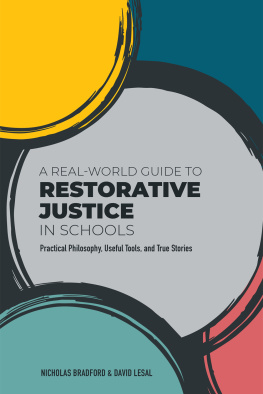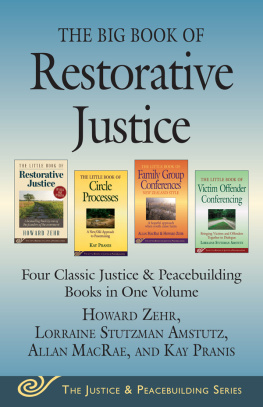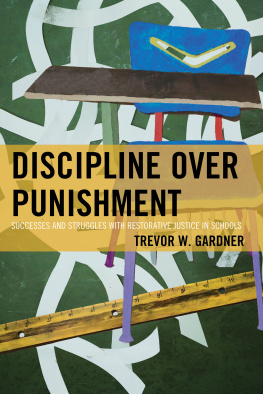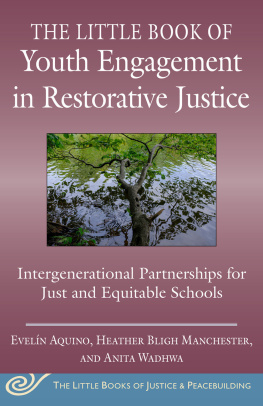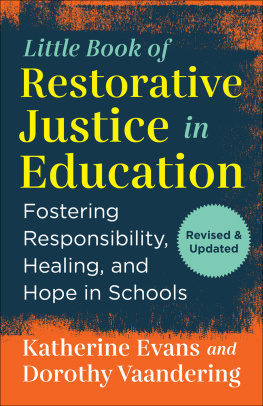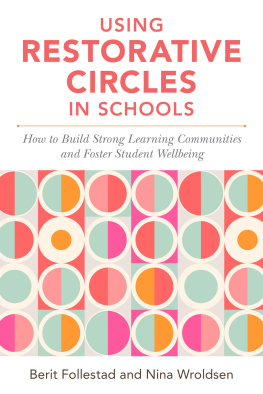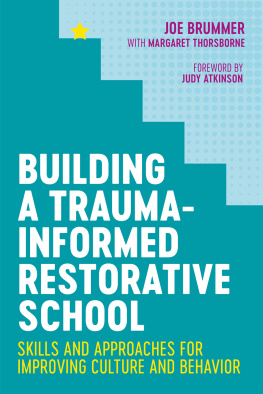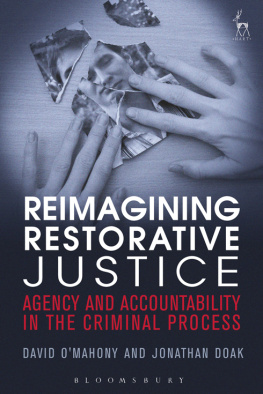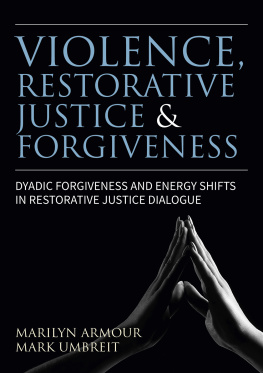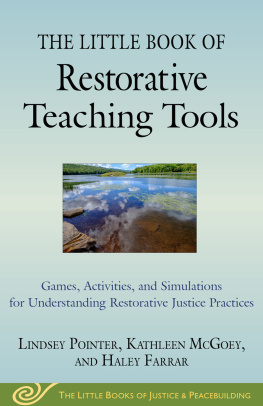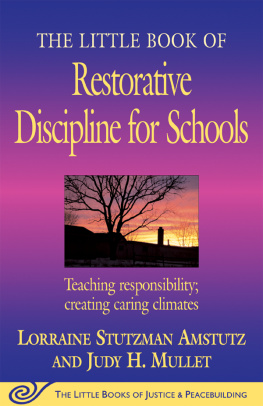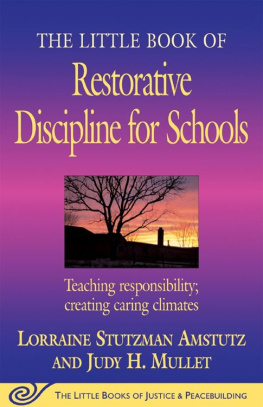Contents

A Real-World Guide
to Restorative
Justice in Schools
PRACTICAL PHILOSOPHY, USEFUL TOOLS,
AND TRUE STORIES
Nicholas Bradford
and
David LeSal

Contents

About the Authors

Nicholas Bradford was a certified teacher in Vermont and hails from Washington via California. He is the son of mixed race parents. His dad is descended from Polish immigrants and French (Canadian) trappers. Nicholas remembers very clearly the very best Polish sausages coming from the community smokehouse outside of Houston, TX. His mom is descended from Mexican/Californian and Native American (Navajo) people. His great-grandmother didnt claim Mexican heritage but instead claimed Californian heritage, as the family was in the region long before California was a state. He has deep roots in the immigrant experience and has struggled to find his ethnic/racial identity. Nicholas has one older brother and two precocious nieces.
Nicholas received his BA from Evergreen State College and his Masters Degree in Education Policy from the University of Washington. His family instilled a great value in education. During his childhood, between the years of three to seven, his mother attended university, raised two children, and worked evenings at Pizza Hut. His dad often worked two or three jobshis full-time job was working nights as a custodian at a community college. His dad valued education, exposed him to Nova and Discovery shows at a young age, read interesting books, and introduced him to professors. While his parents were able to demonstrate through their actions that education is incredibly important, he was unsure (as many are) of how to pay for the costs of attending university after high school.
He made a life-changing decision at the age of 19 to join the United States Coast Guard Reserve, although little did he know that there would be a fair amount of active duty. After his freshman year he attended boot camp, something that is seared into the minds of any who had that opportunity. It was one of many formative experiences in the CG. He deployed twice, first on 9/11 2001 to Washington State in support of Operation Enduring Freedom and again in 2003 to Kuwait and Iraq in support of Operation Iraqi Freedom. As a young man who opposed the war it was hard to reconcile the order and supporting his team members who were being deployed into harms way. This is an example of holding two contradictory things at the same time:
I dont want to support the bombing of the Iraqi people or the invasion of a country, and I cant leave as my comrades are heading into danger.
Years later Nicholas became a teacher in New York and Vermont, and enjoyed working with challenging youth, youth who had been unsuccessful in traditional education settings. He believes this is because of his own non-traditional successful schooling. Working with young people who just want to be heard and valued was, and continues to be, a powerful driver for him.
David LeSal is a certified high school ELA (English language arts) teacher with over 10 years experience in classrooms, and originally hails from New York State.
David was born the son of an agnostic Jewish father raised in Brooklyn and a devout Catholic mother from rural Massachusetts. Feeling a lack of acceptance from either religion led to an early sense of otherness, leading to an interest in, and a search for, personal identity, culture, and spirituality. Both sides of Davids family tree have roots in Russia and Poland. Despite their differing backgrounds, Davids parents shared and fostered similar values of love, family, and education.
Both Davids parents were teachers in low-income urban schools, subsequently working within New York State maximum security prisons as educators, mentors, and administrators. Hearing stories about, and sometimes seeing scenes from within, various prisons made clear to him the entrenched issues of racism, class-ism, and hopelessness in the criminal justice system. These stories, and his parents stories, also provided examples of people working tirelessly and compassionately to make a difference in the lives of individual inmates.
After completing a BA at McGill University in Montreal, Canada, David earned an MFA in Creative Writing/Poetry and formally began teaching as an adjunct professor at City College of New York. While earning his Masters degree he spent almost three years as a substitute teacher throughout New York City (NYC) public schools. This jumping into the deep end of classroom management helped him to discover his natural love for working with middle and high school-aged students, but also exposed some of the greatest failings of many lower-income traditional schools as he spent time working and talking with the students he encountered each day. Ironically, these were many of the same issues that existed in the prisons he had been exposed to during his youth.
Drawing on a love of hip hop music, David created an after-school rap writers club at a school in Brooklyn that caught the attention of a young and ambitious new principal who would eventually offer him a job at one of NYCs first Big Picture Learning (BPL) public high schools. David fell in love with the models focus on internships, student projects, exhibitions, and advisory culture, and remained working at BPL-affiliated schools on the East and West Coast.
It was at Highline Big Picture High School in the Seattle area that he first encountered RJ philosophy and where he also met Nicholas Bradford, who would serve as his mentor and eventually as his colleague. As their work in this area progressed, Nicholas as a trainer and David as an RJ dean in the Bronx, they kept in touch and would eventually partner together in the creation and development of the National Center for Restorative Justice (NC4RJ), providing training and resources to practitioners, educators, students, and others looking to grow their own practice.
David and Nicholas began working together in the Seattle area of Washington State, integrating their past experiences, and sharing a love for including students voices into their RJ work. They continued to share resources and ideas over the next few years, and as Nicholas launched the NC4RJ in 2016, David joined as a training course facilitator, eventually becoming the education director. They now deliver training on RJ and practices, circles, equity, and a host of other transformative topics based on many of the concepts and tools contained in this book. You will find a great deal of encouragement, practical tools, and insightful stories in the pages that follow. We hope you love it.
Introduction

WHO WE ARE
Whether you are new to the concept of restorative justice and practices, or have already developed your practice over many years, there are a ton of reasons to love this work. From decreasing the need for suspensions, and other forms of traditional discipline, to improving the health of your school community and increasing academic outcomes, the benefits of shifting to a restorative mindset are well established and taking root across America. That is not to say that implementing these practices, like all work that is important, doesnt come without difficult challenges, and a need for some tough conversations within the community.

